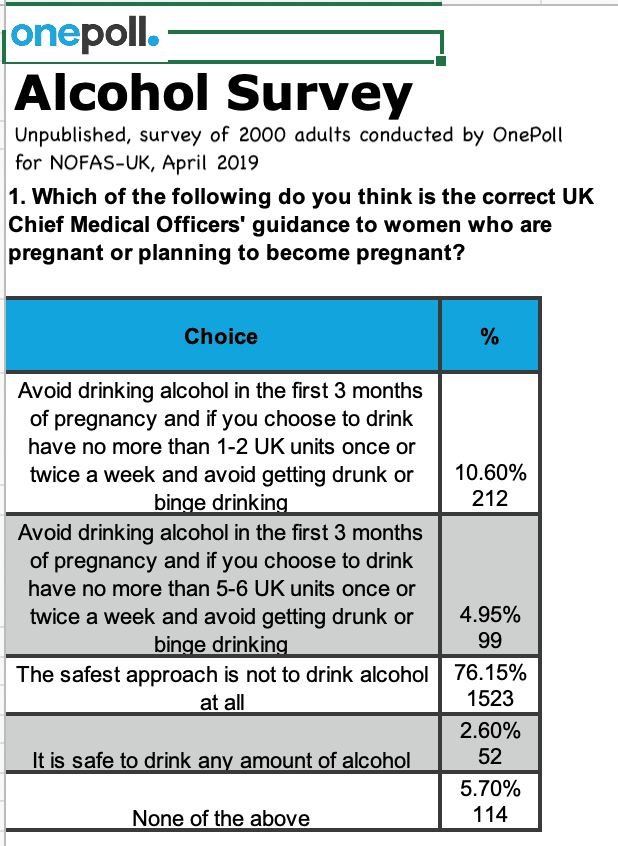
New Poll Shows One Quarter of Young Adults Unaware that UK Guidance is to Avoid Alcohol in Pregnancy.
The National Organisation for FASD has launched a campaign targeted at young adults.
In April-May 2020 NOFAS-UK (now the National Organisation for FASD) engaged OnePoll to conduct two surveys to test awareness of the risks of alcohol in pregnancy and to see if the general population knows the national scientific guidance.
OnePoll polled 2000 18-25 year olds across the UK. The results showed that:
26% could not identify the current Chief Medical Officers’ guidance that the safest approach is not to drink alcohol at all if pregnant or if you could become pregnant.
80% said if they or a loved one (e.g. a sister or friend) were pregnant, that having the occasional drink of alcohol would not be ok. However, their understanding of WHY this is important is limited.
Only 17% understood that alcohol can cause the most long-term harm to the baby when compared with other substances such as heroin, crack cocaine and smoking.
Only 22% knew that the acronym FASD stands for Fetal Alcohol Spectrum Disorder.
49% are getting information about these issues from social media,
while only 40% are getting if from a teacher and only 36% from a doctor, midwife or nurse.
In addition, OnePoll conducted a one-question survey for us of 2000 nationally representative adults to see if they could recognise the CMO guidance. The good news is that awareness has improved over the same question asked last year.
However, there is no room for complacency as this means a significant proportion of the population still has not taken on board the message that it’s safest to avoid alcohol during pregnancy despite this being the official guidance of the UK’s chief medical officers since 2016. It is urgent that senior officials and public health bodies reinforce this message publicly.
No: 100% (166)
Does the CCG have a policy for commissioning services for FASD?
No: 78.31% (130)
Yes: 21.69% (36)
Does the CCG provide services for diagnosing FASD in children?
No: 91.57% (152)
Yes: 8.43% (14)
Does the CCG provide services for diagnosing FASD in adults?
No: 89.76% (149)
Yes: 10.24% (17)
Is the CCG involving individuals with FASD or their caregivers in planning or developing proposals?
No: 86.14% (143)
Yes: 13.86% (23)
Is there a lead person in the CCG on FASD?
No: 81.33% (135)
Yes: 18.67% (31)
Does the CCG provide services for diagnosing FASD in adults?
Based on Freedom of Information requests to all Clinical Commissioning Groups and NHS Trusts and Health Boards, this report highlights the mismatch between government policy and actual practice. The vast majority of CCGs are not commissioning services for FASD prevention, diagnosis or post-diagnostic care for those with FASD. Click here for the BMJ article that covered this report.
Only 67% of 18-25 year olds correctly identified the CMO guidance in this 2019 survey

Only 31% of the GPs said they had in-depth education regarding FASD in their medical school training. 41% of GPs said they have not received clear guidance from their local Clinical Commissioning Group regarding a pathway for diagnosis and support of FASD